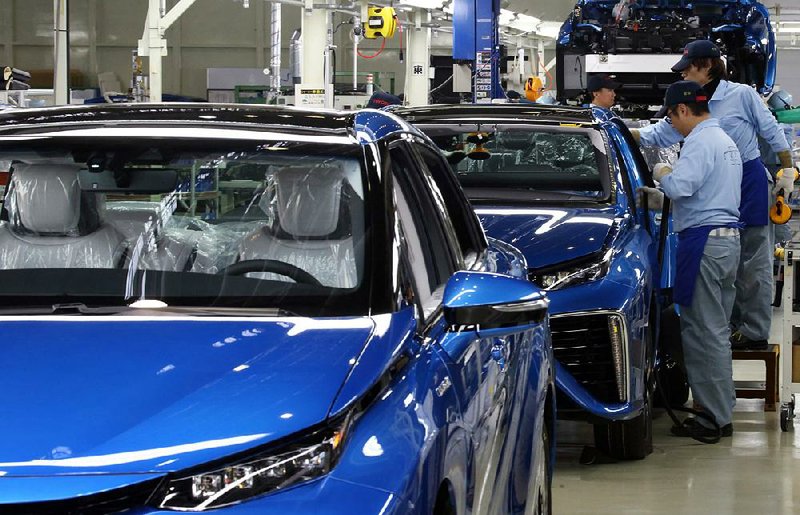Toyota this week officially rolled out what it's betting will mark "a turning point" in automotive history -- a sleek, low-priced, ecologically friendly "future" car that can operate for 300 miles, takes less than five minutes to charge and comes with three years of free fuel.
It's everything haters of gas-guzzling car culture could love. And the biggest name in electric cars hates it.
Toyota's Mirai (meaning "future" in Japanese) will be one of the first mass-market cars to run on hydrogen fuel cells, which convert compressed hydrogen gas to electricity, leaving water vapor as the only exhaust. As opposed to getting plugged in overnight, the sedan will need only about three minutes to get back to full charge.
But the "green" technology has found a surprisingly forceful critic in Elon Musk, the electric-car pioneer and founder of Tesla Motors, maker of the battery-powered Model S. Musk has called hydrogen fuel cells "extremely silly" and "fool cells," with his main critique being that hydrogen is too difficult to produce, store and convert efficiently to fuel, diverting attention from even better sources of clean energy.
"If you're going to pick an energy source mechanism, hydrogen is an incredibly dumb one to pick," Musk said last month in Detroit. "The best-case hydrogen fuel cell doesn't win against the current-case batteries. It doesn't make sense, and that will become apparent in the next few years."
But Toyota, one of Big Auto's few pioneers of fuel-efficient cars such as the Prius hybrid, has not been content to let Musk's aggression stand. Bob Carter, a Toyota senior vice president, slapped back at Musk last month by criticizing his sole focus on battery-powered cars: "If I was in a position where I had all my eggs in one basket, I would perhaps be making those same comments."
The electric-car infighting has created a divide over the future of zero-emission cars. Although they make little sense anywhere else now but California, home of the nation's few hydrogen refueling stations, Toyota and its home country of Japan are investing heavily into ushering in what Prime Minister Shinzo Abe has called the world's "hydrogen era."
The Mirai is an oddity even in the world's small exotic fuel and electric car market. A dozen workers in blue hard hats will handcraft the cars without help of conveyor belt, turning out only three a day, Toyota said. The small-batch operation will roll out 700 this year for the U.S., Japan, Europe, and crank up to 2,000 starting next year.
Toyota plans to sell the Mirai for about $45,000 in the U.S., including about $13,000 in federal and California incentives, starting next year. It will sell to the public in Japan next month.
At 300 miles, the four-seat Mirai offers the longest range of any electric vehicle on the market (and more than Tesla's $80,000 Model S, which gets 265 miles). A full tank of hydrogen, Toyota adds, has enough energy to power the average American home for a week.
But hydrogen fuel cells carry their own challenges. To sell successfully in America, the cars will need a nationwide infrastructure for recharging (a problem Musk has sought to solve with Tesla's national network of "superchargers"). Though its emissions are cleaner, hydrogen is now mostly sourced from natural gas, which carries its own environmental impacts.
But Toyota has been strong in its defense of hydrogen, saying it will give drivers far quicker refueling times and farther range than the typical battery-powered electric car.
Toyota is not the only automaker pushing hard on fuel cells: The hydrogen-powered Hyundai Tucson is now available in California, and Honda's fuel-cell car is expected to roll out next year.
But Toyota has been one of its biggest proponents, opening its more than 5,000 fuel-cell related patents up for free and saying it wants to build and fund new fueling stations, first in California and then stretching to the east coast. California is investing tens of millions of dollars to build 28 hydrogen recharging stations, on top of the 10 it was home to as of last year.
Japan has proved to be far more embracing of the "hydrogen society," investing in self-service hydrogen stations, easing fuel-cell regulations and offering about $25,200 in incentives to early Mirai buyers. Abe, one of the first to receive a Mirai, said he wants all of Japan's agencies to have one, too.
Although Mirai production began in December, Toyota's president, Akio Toyoda, marked Tuesday as the official roll-out date. Five years ago to the day, a congressional panel grilled Toyoda about the automaker's recalls for unintended acceleration programs, a long embarrassment for the major Japanese brand.
"For us, that date marks a new start," Toyoda said. "This is not to reflect on the past, but rather to celebrate Toyota's new start, where we take a fresh step towards the future."
Business on 02/26/2015
